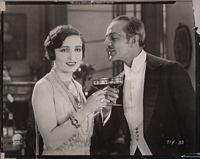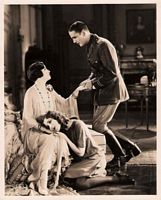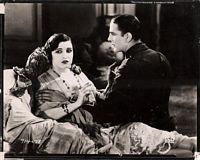

The Little French Girl (1925) Famous Players-Lasky. Distributor: Paramount Pictures. Presenters: Adolph Zukor, Jesse L. Lasky. Director: Herbert Brenon. Screenplay: John Russell. Photography: Hal Rosson. Art Director: Frederick A. Foord. Cast: Alice Joyce, Mary Brian, Neil Hamilton, Esther Ralston, Anthony Jowitt, Jane Jennings, Mildred Ryan, Eleanor Shelton, Maurice Cannon, Maud Turner Gordon, Paul Doucet, Julia Hurley, Mario Majeroni. 6 reels, 5,628 ft. This film appears to be LOST
 |
The notorious mother of the Little French Girl. Thanks to Derek Boothroyd for these stills Click thumbnail for a larger image. |
|
 |
 |
 |
Famous Players production of Anne Douglas Sedgewick's novel of same name. Screen adaptation made by John Russell. Directed by Herbert Brenon, with Alice Joyce, Neil Hamilton, Esther Ralston, and Mary Brian featured. At the Rivoli, New York, May 31 week. Running time, 75 min.
| Mme. Vervier | Alice Joyce |
| Alix Vervier | Mary Brian |
| Giles Bradley | Neil Hamilton |
| Toppie Westmacott | Esther Ralston |
| Owen Bradley | Anthony Jowett |
| Mother Bradley | Jane Jennings |
| Ruth Bradley | Mildred Ryan |
| Jerry Hamble | Maurice Cannon |
| Lady Mary Hamble | Maude Turner Gordon |
| Andre Valenbois | Paul Doucet |
| Mme. Dumont | Julia Hurley |
| DeMaubert | Mario Majeroni |
The novel from which this film was made has had a wide sale and has also received much favorable discussion and criticism. Primarily it was a character study of a lovely little girl, Alix Vervier, and her mother, a lady whose loves were always gentlemen but not always wise.
The plot starts off with the war days, when Capt. Owen Bradley spent his leave in Paris with Mme. Vervier, and of how he loved her. His Anglo-Saxon ideals pictured love as something staple, true and fine, while Mme. Vervier and her French ideals pictured it as a transient pleasure, made for a few moments. Owen was killed in the war, and his brother Giles, holding the dying man in his arms, promised that Mme. Vervier's daughter, Alix, should have the careful upbringing in an English country home.
So Alix goes to England and lives, but meantime Giles, himself a fine young man of strict ideals, discovered Mme. Vervier's nature. Mme. Vervier was not an adventuress nor was she a vampire, but simply a beautiful woman with whom men fell in love and in whose nature was the desire to reciprocate their affection. She wanted Alix to be different and suggested that Giles marry her. It got to the point where Jerry Hamble, of a noble family, proposed and was accepted. Giles at that time had hopes of marrying Toppie Westmacott, daughter of a minister and beloved by his dead brother.
Giles' dream faded and Toppie found peace in a convent, while an old crone from France ruined the chances of Alix by telling inside stuff on her mother. Alix rejoined her mother, and it was sometime later in Venice that Giles knew he loved her.
The story is excellent and while not strictly faithful to the book, is fine movie material and at all times is well played by a finely balanced cast. Alice Joyce is particularly fine as Mme. Vervier, while Neil Hamilton and Paul Doucet turn in impersonations as the hero and parasite that are worthy of high ranking. Mary Brian is sweet and appealing as Alix. Brenon's direction is even and sure, while the technical work is as usual-unbeatable. Some of the exterior scenes are beautiful.
Although "The Little French Girl" is a good picture on its own, its worth to the exhibitor depends principally on the names in the cast, for no book yet has ever circulated this country to the extent of penetrating all the country towns. It looks like the film will be an excellent program picture but may be a first run disappointment. Exploitation can help it, but it should not be of the sensational or sexy variety. This is a well considered picture and any advertising connected with it should be of the same type.
"The Little French Girl"
Mary Brian Scores Again and Shares Honors with Alice Joyce in Entertaining Paramount Film
Reviewed by C.S. Sewell.
From the audience standpoint, probably the most interesting point about "The Little French Girl," Herbert Brenon's newest production for Paramount is the fact that it again presents on the screen little Mary Brian, who created such a decidedly favorable impression by her impersonation of Wendy in "Peter Pan." So we might as well go on the record right now by saying that she will not disappoint her admirers. Her role here is naturally different from the fairy-like one of Wendy, and is that of a decidedly unsophisticated ingenue, but is marked by the same unaffected and unassuming charm of innocent girlhood.
Because of the prominence of her role, Alice Joyce, as her mother, shares the limelight with Mary. Miss Joyce's role is that of a woman who is as sophisticated as her daughter is innocent, a woman with whom love is but a romantic episode lasting until a new hero comes along to arouse her fancy.
The story is based on the contrast between the severe and rugged British ideas of love and the supposedly more free and easy attitude of Continental Europe, and the drama arises from the fact that from the standpoint of the British hero and his people the mother is not morally what she should be.
A smoothly built scenario providing good continuity holds the interest although a lack of action and tendency of the director to spend much time in grouping and posing his players and telling the majority of the story in the subtitles causes a noticeable slowness of movement. There is, however, unusually beautiful photgraphy [sic], with striking sets and exterior shots and good character development. Where there is naturally no suspense as to the final outcome, it is entertaining to watch how it is worked out.
Because of the character of the mother, the picture will probably appeal more to sophisticated audiences, but Mary Brian's charm and the smoothness and beauty of the production should make it entertaining for all classes of patrons even though some may not care for this type of story.
In a different role from usual, Alice Joyce does good work and her dignity and restraint goes far to establishing sympathy for an otherwise unsympathetic character. Neil Hamilton, as the hero, effectively portrays the idea of the staid dignified type of Britisher, who seems somewhat cold and austere from an American standpoint. Esther Ralston, who appeared as the mother in "Peter Pan," gives a good performance as a girl who reveres the memory of her dead lover.
Cast.| Madame Vervier | Alice Joyce |
| Alix Vervier | Mary Brian |
| Giles Bradley | Neil Hamilton |
| Toppie | Esther Ralston |
| Owen Bradley | Anthony Jowett |
| Jerry Hamble | Maurice Cannon |
| Lady Hamble | Maude Gordon |
| Andre | Paul Doucet |
| Mme. Dumont | Julia Hurley |
| DeMaubert | Mario Majeroni |
Based on novel by Anne Douglas Sedgwick
Scenario by John Russell.
Directed by Herbert Brenon.
Length, 5,851 feet.
Story
During the war Owen Bradley, pleading that his leave had been cancelled, fails to visit his home and sweetheart, Toppie, in England but spends his time with Madame Vervier, with whom he is infatuated. Owen is killed in action but in accordance with his promise, his brother Giles takes Madame Vervier's daughter to his mother in England, where she soon becomes a favorite and finally engaged to a viscount. In the meantime, Giles, who has always loved Toppie, tries in vain to win her and she finally enters a convent. To prevent her and aid Giles, Alix, Madame Vervier's daughter, tells Toppie the truth and Toppie denounces Madame Vervier as a bad woman. Giles has already learned that his brother was only one of many with whom Madame had affairs. This truth finally becomes known in England and the viscount breaks his engagement with Alix. When Toppie enters a convent, Giles realizes that he really loves Alix and returning to France finds Andre is attentive to her. He soon, however, learns the truth that Alix has always loved him (Giles), so he takes her in his arms.
Last revised December 25, 2014